Photo by Erik Jacobs
It was the commencement address watched around the world—on ABC, MSNBC, and C-SPAN, via live stream, and on social media. Groups of alumnae gathered in locations as close as Jewett Auditorium and as far away as San Diego to view it. The address even appeared on the news in Japan and has been watched hundreds of thousands of times on YouTube.
But despite the plethora of news cameras, to the class of ’17, it was still their day. When they marched into the vast white tent on Severance Green, a loud cheer went up from the thousands gathered to celebrate them. Yes, hundreds of phones had been raised to take pictures when commencement speaker Hillary Rodham Clinton ’69 processed in, but even more were held in the air to capture the graduates.
In her remarks, Clinton, a member of another green class, urged the graduates to live the College motto, get involved in causes that matter to them, and not sit on the sidelines. Above all, she said, “Double down on your passions. Be bold. Try, fail, try again, and lean on each other. Hold on to your values. Never give up on those dreams.”
President Paula Johnson, presiding over her first commencement, noted that the seniors were entering an increasingly polarized world, where many of the values at the heart of a liberal-arts education are under fire. She reminded them of the need for community in such times: “The fact is, it is very, very difficult to be resilient on your own. It is also difficult to change the world alone. As we strive to serve the larger world, community both sustains us and propels us forward. … You are now and forever Wellesley women—members of a village, a network, a community of which I’ve never seen the equal.”
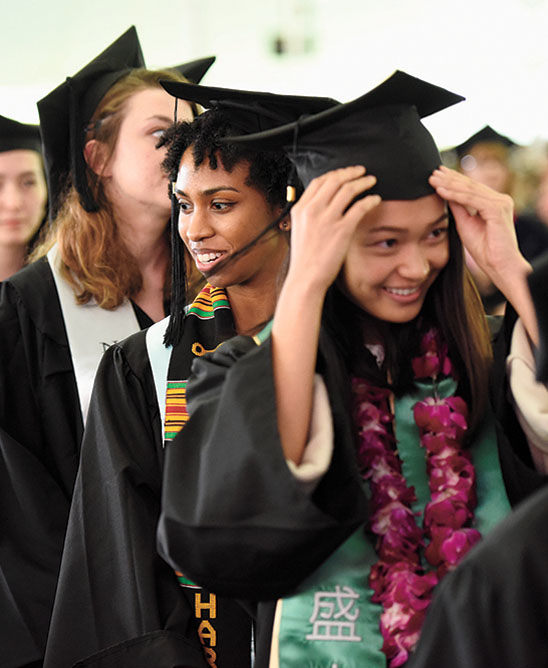
Photo by Richard Howard
Excerpts from Clinton’s Address
Four years ago, … you arrived from all over. You joined students from 49 states and 58 countries. Now, maybe you felt like you belonged right away. I doubt it. But maybe some of you did, and you never wavered.
But maybe you changed your major three times and your hairstyle twice that many. Or maybe, after your first month of classes, you made a frantic collect call (ask your parents what that was) back to Illinois to tell your mother and father you weren’t smart enough to be here. My father said, “OK, come home.” My mother said, “You have to stick it out.” That’s what happened to me.
But whatever your path, you dreamed big. You probably, in true Wellesley fashion, planned your academic and extracurricular schedule right down to the minute. So this day that you’ve been waiting for—and maybe dreading a little—is finally here.
As President Johnson said, I spoke at my commencement 48 years ago. I came back 25 years ago to speak at another commencement. I couldn’t think of any place I’d rather be this year than right here.
Now, you may have heard that things didn’t exactly go the way I planned. But you know what? I’m doing OK. I’ve gotten to spend time with my family, especially my amazing grandchildren. I was going to give the entire commencement speech about them but was talked out of it. Long walks in the woods, organizing my closets, right? I won’t lie, Chardonnay helped a little, too.
But here’s what helped most of all: remembering who I am, where I come from, and what I believe. And that is what Wellesley means to me. This College gave me so much. It launched me on a life of service and provided friends that I still treasure. So wherever your life takes you, I hope that Wellesley serves as that kind of touchstone for you.
… Václav Havel, the dissident playwright, first president of the Czech Republic, wrote an essay called “The Power of the Powerless.” And in it, he said: “The moment someone breaks through in one place, when one person cries out, ‘The emperor is naked!’—when a single person breaks the rules of the game, thus exposing it as a game—everything suddenly appears in another light.”
What he’s telling us is, if you feel powerless, don’t. Don’t let anyone tell you your voice doesn’t matter. In the years to come, there will be trolls galore—online and in person—eager to tell you that you don’t have anything worthwhile to say or anything meaningful to contribute. They may even call you a nasty woman. Some may take a slightly more sophisticated approach and say your elite education means you are out of touch with real people. In other words, “Sit down and shut up.” Now, in my experience, that’s the last thing you should ever tell a Wellesley graduate.
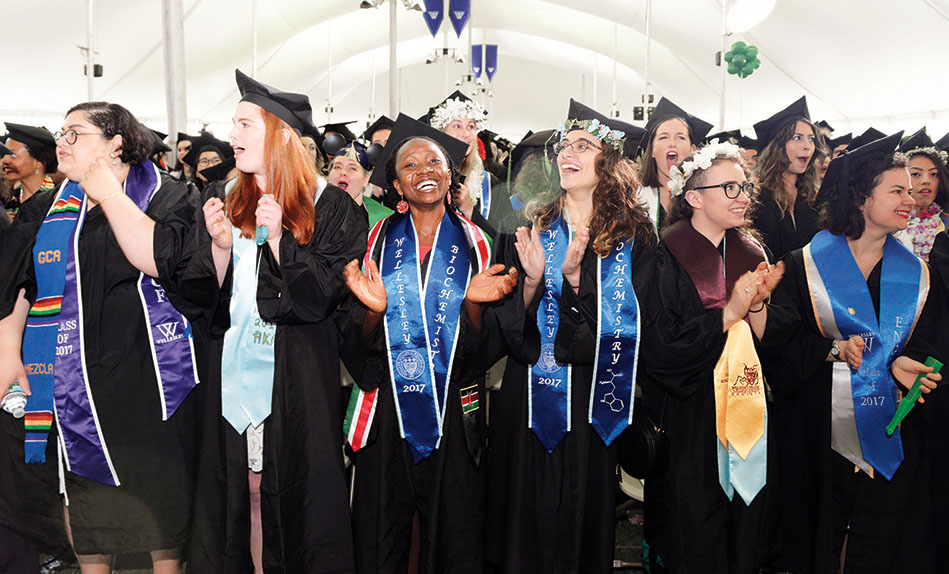
Photo by Richard Howard
And here’s the good news. What you’ve learned these four years is precisely what you need to face the challenges of this moment. First, you learned critical thinking. I can still remember the professors who challenged me to make decisions with good information, rigorous reasoning, real deliberation. I know we didn’t have much of that in this past election, but we have to get back to it. After all, in the words of my predecessor in the Senate, Daniel Patrick Moynihan, “Everyone is entitled to his own opinion, but not his own facts.”
And your education gives you more than knowledge. It gives you the power to keep learning and apply what you know to improve your life and the lives of others. Because you are beginning your careers with one of the best educations in the world, I think you do have a special responsibility to give others the chance to learn and think for themselves, and to learn from them, so that we can have the kind of open, fact-based debate necessary for our democracy to survive and flourish. And along the way, you may be convinced to change your mind from time to time. You know what? That’s OK. Take it from me, the former president of the Wellesley College Young Republicans.
Second, you learned the value of an open mind and an open society. At their best, our colleges and universities are free marketplaces of ideas, embracing a diversity of perspectives and backgrounds. That’s our country at our best, too. An open, inclusive, diverse society is the opposite of and antidote to a closed society, where there is only one right way to think, believe, and act. Here at Wellesley, you’ve worked hard to turn this ideal into a reality. You’ve spoken out against racism and sexism and xenophobia and discrimination of all kinds. And you’ve shared your own stories. And at times that’s taken courage. But the only way our society will ever become a place where everyone truly belongs is if all of us speak openly and honestly about who we are, what we’re going through. So keep doing that.
And let me add that your learning, listening, and serving should include people who don’t agree with you politically. A lot of our fellow Americans have lost faith in the existing economic, social, political, and cultural conditions of our country.
Many feel left behind, left out, looked down on. Their anger and alienation has proved a fertile ground for false promises and false information. Their economic problems and cultural anxiety must be addressed, or they will continue to sign up to be foot soldiers in the ongoing conflict between “us” and “them.”
… If your outreach is rebuffed, keep trying. Do the right thing anyway. We’re going to share this future. Better to do so with open hearts and outstretched hands than closed minds and clenched fists.
And third, here at Wellesley, you learned the power of service. Because while free and fierce conversations in classrooms, dorm rooms, dining halls are vital, they only get us so far. You have to turn those ideas and those values into action. This College has always understood that. The motto, which you’ve heard twice already, “Not to be ministered unto, but to minister” is as true today as it ever was. If you think about it, it’s kind of an old-fashioned rendering of President Kennedy’s great statement, “Ask not what your country can do for you, ask what you can do for your country.”

Photo by Richard Howard
… Don’t be afraid of your ambition, of your dreams, or even your anger—those are powerful forces. But harness them to make a difference in the world. Stand up for truth and reason. Do it in private—in conversations with your family, your friends, your workplace, your neighborhoods. And do it in public—in Medium posts, on social media, or grab a sign and head to a protest. Make defending truth and a free society a core value of your life every single day.
So wherever you wind up next, the minute you get there, register to vote, and while you’re at it, encourage others to do so. And then vote in every election, not just the presidential ones. Bring others to vote. Fight every effort to restrict the right of law-abiding citizens to be able to vote as well. Get involved in a cause that matters to you. Pick one, start somewhere. You don’t have to do everything, but don’t sit on the sidelines. And you know what? Get to know your elected officials. If you disagree with them, ask questions. Challenge them. Better yet, run for office yourself some day. Now that’s not for everybody, I know. And it’s certainly not for the faint of heart. But it’s worth it. As they say in one of my favorite movies, A League of Their Own, “It’s supposed to be hard. The hard is what makes it great.”
… Our culture often celebrates people who appear to go it alone. But the truth is, that’s not how life works. Anything worth doing takes a village. And you build that village by investing love and time into your relationships. And in those moments for whatever reason when it might feel bleak, think back to this place where women have the freedom to take risks, make mistakes, even fail in front of each other. Channel the strength of your Wellesley classmates and experiences. I guarantee you it’ll help you stand up a little straighter, feel a little braver, knowing that the things you joked about and even took for granted can be your secret weapons for your future.
… Whatever your dreams are today, dream even bigger. Wherever you have set your sights, raise them even higher. And above all, keep going. Don’t do it because I asked you to. Do it for yourselves. Do it for truth and reason. Do it because the history of Wellesley and this country tells us it’s often during the darkest times when you can do the most good. Double down on your passions. Be bold. Try, fail, try again, and lean on each other. Hold on to your values. Never give up on those dreams.
I’m very optimistic about the future, because I think, after we’ve tried a lot of other things, we get back to the business of America. I believe in you, with all my heart. I want you to believe in yourselves. So go forth, be great. But first, graduate. Congratulations!





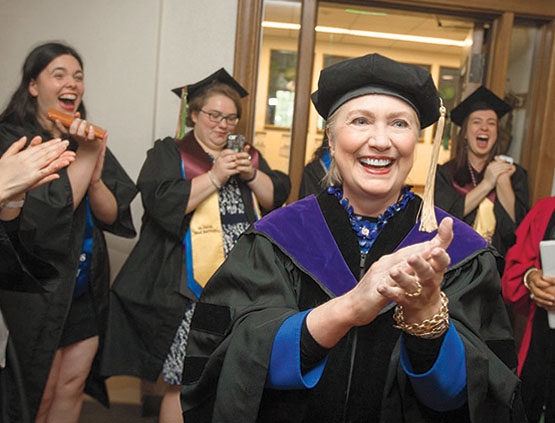


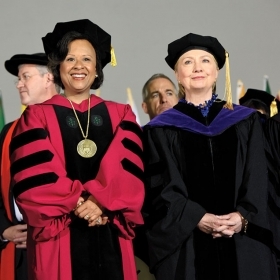
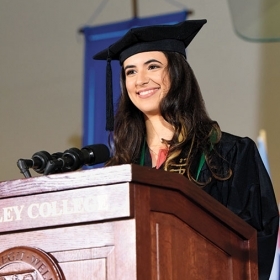

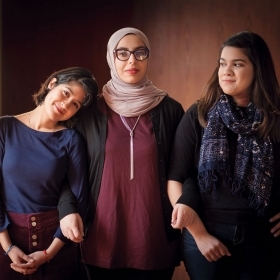
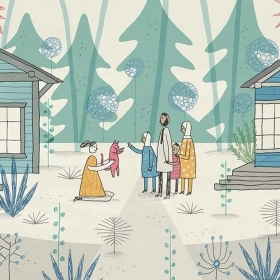
We ask that those who engage in Wellesley magazine's online community act with honesty, integrity, and respect. (Remember the honor code, alums?) We reserve the right to remove comments by impersonators or comments that are not civil and relevant to the subject at hand. By posting here, you are permitting Wellesley magazine to edit and republish your comment in all media. Please remember that all posts are public.